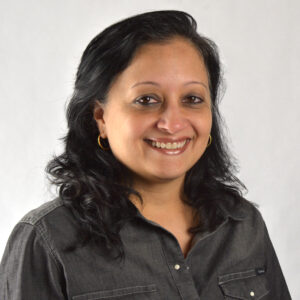Description: This presentation will focus on a few aspects of Indian culture, including how the family setting is built on traditional beliefs. We will discuss how the diagnosis of autism could be perceived, and how the family dynamics can be affected and perceived. Participants will walk away with tools and takeaways to help our autistic individuals and their families to cope and reach out for supports.
Learning objectives: By end of the presentation, participants will be able to
- Demonstrate a clear understanding of the culture of India from the presenter’s lived experiences.
- Describe how the culture of autism can look different in an Indian household.
- Utilize specific tools to help our individuals of Indian origin on the spectrum.
 Trainer: In her current role at Autism Society of North Carolina, Shagun Gaur provides resources to individuals, families, and professionals throughout the Charlotte Area, which includes 10 counties. She also delivers presentations and workshops, and provides autism-related information to service providers, families, and other stakeholder groups.
Trainer: In her current role at Autism Society of North Carolina, Shagun Gaur provides resources to individuals, families, and professionals throughout the Charlotte Area, which includes 10 counties. She also delivers presentations and workshops, and provides autism-related information to service providers, families, and other stakeholder groups.
Having spent the first two decades of her life in India and the next two in the USA has given her an opportunity to imbibe and understand the cultures of both nationalities. This has taught her to appreciate the similarities and understand the difference between the two cultures and help others who struggle with this sentiment.
As a very involved and dedicated mother of a 23-year-old son living on the spectrum, who has been severely impacted cognitively, she has learned to understand various concerns and challenges faced by others on this journey. She has made it her mission to share her experience and to help and inspire others who struggle to walk on this difficult path which is blurry and often unpredictable.
Shagun earned her bachelors in Homeopathic Medical Science before immigrating to the United States in 1996. She managed to own and operate her business, study project management, and manage various fronts in her life while raising two wonderful boys before she took up a position at the Autism Society of NC as an Autism Resource Specialist in 2018.
References:
- Chakraborty, S., Bhatia, T., Sharma, V., Antony, N., Das, D., Sahu, S., Sharma, S., Shriharsh, V., Brar, J. S., Iyengar, S., Nimgaonkar, V. L., & Deshpande, S. N. (2020). Protocol for development of the Indian Autism Screening Questionnaire: The screening version of the Indian scale for assessment of autism. Indian Journal of Psychological Medicine, 42(6_suppl). https://doi.org/10.1177/0253717620969068
- Chauhan, A., Sahu, J., Jaiswal, N., Kumar, K., Agarwal, A., Kaur, J., Singh, S., & Singh, M. (2019). Prevalence of autism spectrum disorder in Indian children: A systematic review and meta-analysis. Neurology India, 67(1), 100-104. https://doi-org.libproxy.lib.unc.edu/10.4103/0028-3886.253970
- Sengupta, K., Mahadik, S., & Kapoor, G. (2020). Glocalizing project impact: Feasibility, acceptability and preliminary outcomes of a parent-mediated social communication intervention for autism adapted to the Indian context. Research in Autism Spectrum Disorders, 76. https://doi.org/10.1016/j.rasd.2020.101585